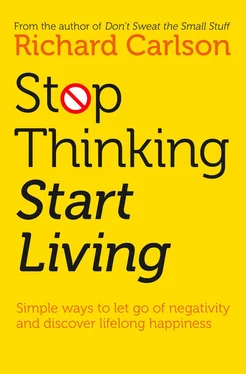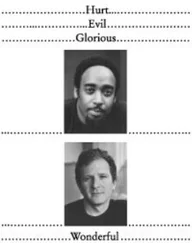Two / Your Thoughts and the Way You Feel
We are all constantly thinking – and it’s a good thing that we do! Without the ability to think, our lives would seem to have little significance. It’s important to realize that you are constantly thinking. Don’t be fooled into believing that you are already aware of this fact, because you probably are not. Think, for a moment, about your breathing. Until the moment I brought it to your attention, you had most certainly lost sight of the fact that you were doing it. Breathing is so natural and automatic that unless you are out of breath you simply forget that you’re doing it.
Thinking works the same way. Because you’re always doing it, it’s easy to forget that it’s happening, and it becomes invisible to you. Unlike breathing, however, forgetting that you are thinking, even for a moment, can cause some serious problems in your life, including unhappiness, even depression. The reason is that your thinking will always come back to you as a feeling. Let me explain: the way you feel right now is the result of your thoughts at this very moment. In a broader sense, the way you feel is always determined by the thoughts you are thinking. Suppose you have the thought as you are reading this material. ‘This is far too simplistic – my problems are far more serious than Dr Carlson could possibly imagine.’ The result of this thought would be that you would be feeling sceptical and pessimistic right now. This is not a coincidence. Before you had these thoughts, you weren’t feeling pessimistic. Your thoughts created your sceptical feeling, the words I have written did not. If the words themselves created feelings, then everyone who read them would feel the same way, which of course they don’t. The relationship between your thinking and how you are feeling is formed so fast (in a tiny fraction of a second) that almost no one realizes it’s occurring. Yet this cause-and-effect relationship between thoughts and feelings is one of the most powerful phenomena you will ever experience as a human being.
Now suppose that as you were reading the morning paper, you came across an article about a little girl who was rescued from a burning building. As you read the story you had the thought, ‘What a relief.’ As soon as you had this inspiring thought you felt an uplifting of your spirits. Again, your emotion was created by your thoughts about the event – not the event itself. If you had thought differently, you would have felt differently. For example, if you had the thought, ‘It’s about time they included a happy story. The papers are always filled with bad news,’ you wouldn’t have felt uplifted but pessimistic. The feelings that accompany the thoughts you are having happen in an instant. This psychological dynamic is true all the time – there are no exceptions. Whenever you have a thought, and believe that thought to be true, you will feel a corresponding emotional response to that thought. Your thoughts always create your emotions . Understanding the significance of this fact is the first step in escaping from unhappiness and depression.
Negative and pessimistic thoughts, regardless of their specific content, are the root cause of all of your negative and self-defeating emotions. In fact, it’s neurologically impossible for you to feel anything without first having a thought – you simply wouldn’t have a reference point. Try feeling guilty without first thinking guilty thoughts. Try feeling angry without thinking about something that makes you angry. You can’t do it. In order to experience an event, you must process that event in your mind thereby interpreting it and giving it meaning and significance. This understanding has enormous implications. It suggests that if you feel unhappy, it’s not your life, your circumstances, your genes, or your true nature that is creating your unhappiness – it’s your thinking. Unhappiness doesn’t, and can’t, exist on its own. Unhappiness is the feeling that accompanies your negative thinking about your life. In the absence of that thinking, the unhappiness can’t exist. There is nothing to hold your negative feelings in place other than your thinking.
I am not saying that there are never physiological components that compound an unhappy or depressed state, or that make a person predisposed to unhappiness or depression. I am saying, however, that without thought there is no fuel to throw on the fire, there is nothing to foster the predisposition or physiological components into a reality.
It’s interesting to note that there have always been people who would seem to have every reason to be depressed – circumstances that depress some of us just hearing about them: helpless poverty, unbelievable hardships, cruel treatment by others. But some people simply don’t experience unhappiness regardless of how serious their circumstances appear to be. They make the best out of the situation they are in. There are other people who apparently have every reason to feel happiness and contentment, people who are often tormented by depression. Rather than appreciating what they have, they focus on what they would rather have.
Thinking Turns Events into Problems
Let’s suppose that two of your friends are getting divorced. You had always assumed that if anyone could make it, this couple could. On Wednesday, the couple started divorce proceedings, and a week later your friend called you to tell you the news. ‘Oh no,’ you say and instantly begin to feel bad. Interesting, isn’t it? The event has already taken place, it’s long over. But now, as you think about the event, you start to feel bad. Clearly the event itself didn’t make you feel bad. It happened seven days ago and you didn’t even know about it. Your thoughts about the event are the guilty party, responsible for the way you feel. The event was certainly ‘real’ but it meant nothing to you – it was neutral – until you were able to bring it to life through your thinking. Interestingly enough, had your thinking interpreted the divorce differently, you would have felt differently. You may just as easily have thought to yourself, ‘Oh well, I suppose only they can know what is best for them.’ This thought may have left you with a feeling of compassion and understanding.
Think of a more mundane example – snow. For some people snow means snowballs, sledges, skiing, and snowmen. For these people, snow is cause for great celebration! For others, however, snow means dead batteries, a slushy mess, cold weather, and so on. In short, the snow is cause for a lot of complaining. Take note, however, that the snow itself doesn’t care how you think about it. The snow is neutral. It just exists and goes on being snow. It doesn’t cause the positive or the negative reactions and feelings you may have. Only your thinking can do that for you. I hope this illustrates how you use your thinking to create emotional responses which give you an experience of life. Your thinking, not the events themselves, cause your emotional responses.
Your Thoughts Aren’t Real
If you could understand that your thoughts aren’t real you could stop reading right now, because you would feel a tremendous sense of relief and you would have realized how to create happiness in your life – forever. And even though it is going to take some explanation on my part, the statement is true. Think about it: your thoughts aren’t real. They are real thoughts, but they’re not the same thing as concrete ‘reality’.
When you think, you are using your imagination to create an image or picture in your mind of an event rather than the real thing. If you are driving home from a football match, reviewing the game in your mind, you are merely imagining what the game was like. The game is no longer real, it’s now only in your mind, in your memory. It was real once, but not any longer. Similarly, if you are thinking about how bad your marriage is, you are considering it in your mind. It’s all in your imagination . You are literally ‘making up’ your relationship. The thoughts you are having about your relationship are just thoughts. This is why the old saying, ‘Things aren’t as bad as they seem’ is almost always true. The reason things ‘seem so bad’ is because your mind is able to recreate past events, and preview upcoming events, almost as though they were happening right in front of you, at that moment – even though they’re not. To make matters worse, your mind can add additional drama to any event, thereby making that event seem even worse than it really is, or was, or will be. Even more important, your mind can review the imagined event dozens of times in a matter of seconds! This is very important to understand, because while an actual event such as an argument with a friend can last a minute or two, your mind can recreate that very event, magnify it, and make it last three hours – or an entire lifetime. But that argument is no more real now than an argument you had with your father ten years ago. The point is that now , when your life is really happening, that remembered argument is just a thought, an event being created within your own mind.
Читать дальше












